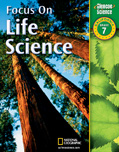

Focus On Life Science: California Grade 7Lesson 1: Relative Ages of RocksStandards Check |  |
 | ||||||||||||||||||||||||||||||||||||||||||

| ||||||||||||||||||||||||||||||||||||||||||



Unit Resources
Chapter Activities
Lesson Resources



Teacher
Student
Unit Resources
Student
Chapter Activities
Student
Lesson Resources
Student

  | |||||||||||||||||||||||||||||||||||||||||||||||||
Please read our Terms of Use and Privacy Policy before you explore our Web site. To report a technical problem with this Web site, please contact the Web Producer. | |||||||||||||||||||||||||||||||||||||||||||||||||


